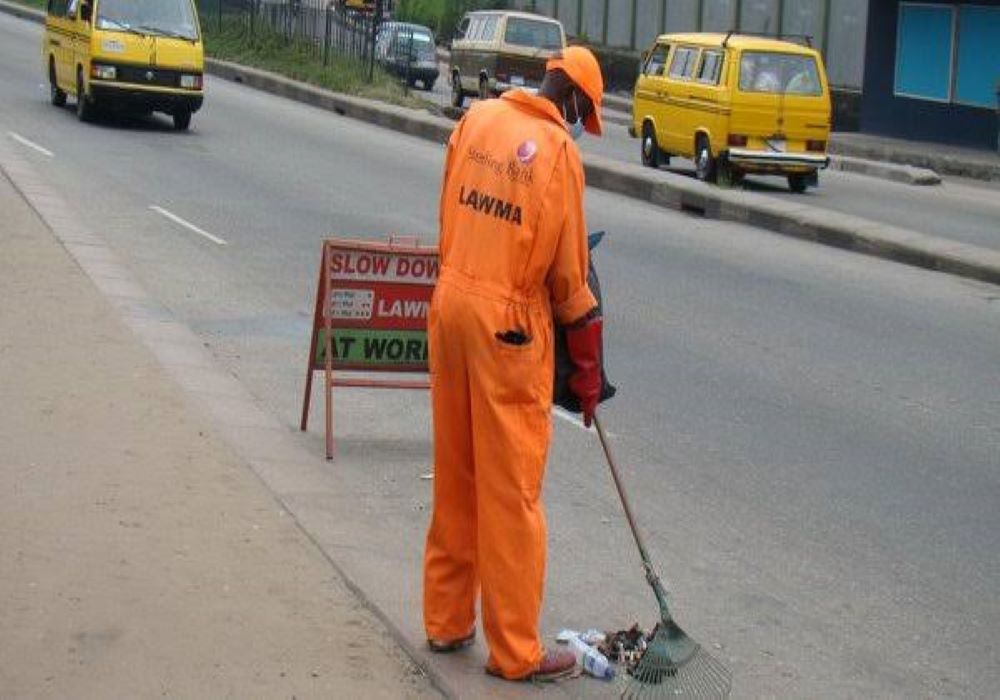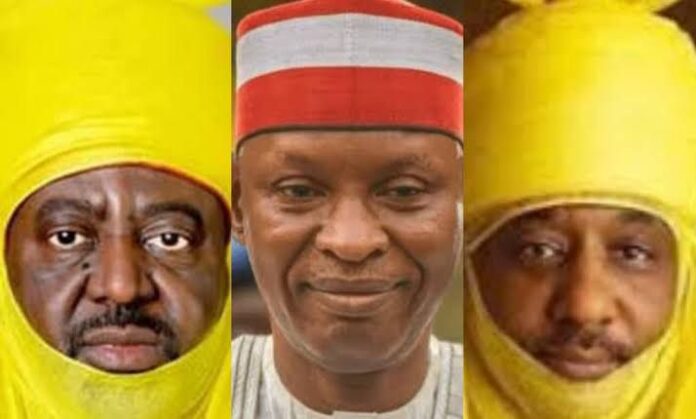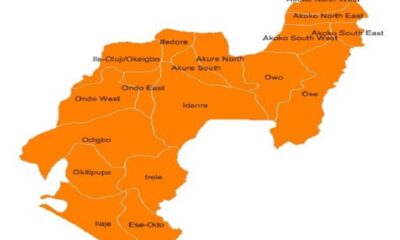NEWS
Police arrest LAWMA worker for faking kidnap, demands N5m ransom

The Lagos Waste Management Authority’s worker, Rafiu Rahaman, has been arrested for faking his kidnapping and seeking N5 million in ransom from his colleagues in Lagos State.
On Friday, state police spokesperson Benjamin Hundeyin issued a statement to that effect.
After faking his kidnapping, Rahaman went to Lugbe, Abuja, where he filmed a video of himself in captivity and sent it to one of his coworkers, according to Hundeyin.
According to the PPRO, Rahaman’s accomplice, Usman Sheidu, requested a N5 million ransom and was given N150,000 following protracted negotiations.
Read Also >> Court Sentence Killers Of Fasoranti’s Daughter To Death
He said, “Detectives of the State Criminal Investigation Department, Lagos, have arrested one Rafiu Rahaman, an employee of the Lagos Waste Management Authority in Lagos for faking his kidnap.
“Rahaman, after faking his kidnap, traveled to Lugbe, Abuja, where he made a video of himself in captivity, which was sent to his co-worker. His accomplice Usman Sheidu, who demanded N5m ransom but got N150,000 after extensive negotiation has equally been arrested.
“Investigation reveals that Usman Sheidu, who was arrested in Abuja, conspired with Rahaman to self-stage the kidnap and make the video that was sent to the co-workers for ransom.”
Usman admitted to sharing the ransom evenly with Rahaman during interrogation, according to Hundeyin, and used his part to buy a generator and other stuff for himself.
The PPRO said: “Suspects will be arraigned in court at the conclusion of the investigations. The Lagos State Commissioner of Police, Abiodun Alabi, while commending the detectives for a job well done, reassures Lagosians that perpetrators of crimes will not go undetected and unpunished.”
NEWS
Ohanivo Upbeat As Sen Umahi Emerges Silverbird’s Most Outstanding Minister Of The Year

The entire 10 communities of the old Ohaozara Local Government Area, known as Ohanivo, of Ebonyi State have been reverberating with joy, because their illustrious son, the Minister of Works, HE Sen. Engr (Dr) Nweze David Umahi emerged Silverbird’s Most Outstanding Honourable Minister of the Year.
Biztellers reports that Ohanivo is made up of three LGAs, including, Ohaozara, Onicha and Ivo, while the 10 autonomous communities are Uburu, Okposi, Aka Eze, Ishiagu, Isu, Onicha, Ugwulangwu, Ukawu, Abaomege, and Oshiri.
Feelers from the organisers of the glamourous awards, Silverbird Group, assure that plans have been fine-tuned for the annual event, billed for the Eko Hotel and Suites, Victoria Island, Lagos on Sunday.
There are indications that a strong team of community leaders including Chief Kenneth Eze, Uche Umezurike, Okoro Enekwachi, Francis Ekwe, Emma Nwaze, among others would be on ground to cheer the distinguished minister of works as he receives his well-deserved award.
ALSO READ: Edo Women Protest Against Natasha Over Akpabio
In a related development, the Member, House of Representatives, representing Ohaozara/Onicha/Ivo Federal Constituency, Hon. (Dr.) Kama Nkemkanma, has sent his congratulatory message to Sen Umahi.
Hon Nkemkanma’s message reads, “It is with deep pleasure that I convey the profound felicitations of my family and good people of Ohaozara/Onicha/Ivo Federal Constituency to our dear leader and achiever, His Excellency, Sen. Engr (Dr) Nweze David Umahi CON, FNSE, FNATE, GGCEHF, Honourable Minister of Works on his emergence as the Silverbird Most Outstanding Honourable Minister of the Year. Whom the cap fits, let him wear.
“Your Excellency, the initiative of this administration to construct the Renewed Hope four (4) legacy projects and the will power to continue the funding and construction of the inherited on-going projects across the six (6) Geo-political Zones are eloquent testimonies of the commitment of Mr President in unlocking the potentials of every segment of our country and building a regenerative economy for sustainable future. We are proud that you have unmitigated signature in this memory. May God continue to give you the flourishing grace and enablement to always be on top in your endeavours.
“Please accept the assurances of the prayers, solidarity, and esteemed regards of my constituents, always. Once more congratulations.”
NEWS
Kano Gov’t Clarifies Appeal Court Ruling On Emirship Dispute

The Kano State Government has addressed widespread misinterpretations surrounding the recent Court of Appeal judgment on the ongoing emirship dispute, urging the public to rely on accurate legal information.
In a statement issued on Saturday, Governor Abba Yusuf’s spokesman, Sunusi Dawakin-Tofa, clarified the ruling and the government’s position.
READ MORE: JUST IN: Court Of Appeal Orders Retrial In Kano Emirate Dispute
Speaking at a press briefing at the Nigeria Union of Journalists (NUJ) Secretariat in Kano, the state’s Attorney General and Commissioner for Justice, Haruna Dederi, explained that the Court of Appeal’s verdict, delivered on January 10, 2025, upheld the repeal of the Kano Emirate Council Law, 2019, effectively overturning the previous judgment of the Federal High Court, Kano.
However, Dederi noted that Alhaji Aminu Dan’agundi, who was dissatisfied with the ruling, has since filed an appeal at the Supreme Court.
He further stressed that the Appeal Court’s judgment remains binding until the Supreme Court rules otherwise.
Addressing concerns over the stay of execution recently granted by the Court of Appeal, the Attorney General described it as a standard legal procedure intended to maintain the status quo pending the Supreme Court’s final decision.
“The Kano State Government urges the public to remain calm, law-abiding, and avoid any form of provocation,” the statement read.
The government has also directed its legal team to thoroughly review the proceedings and determine the next steps in accordance with the law.
On behalf of the governor, Dederi expressed appreciation to the people of Kano for their patience, understanding, and continuous prayers for peace and progress in the state and the nation.
The emirship dispute has been a topic of intense debate in Kano, with various legal and political implications.
NEWS
Niger Delta Youths Threaten Oil Shutdown Over Rivers Crisis

Tensions are rising in Rivers State as the Niger Delta Youth Council (NDYC) has issued a seven-day ultimatum to President Bola Tinubu, threatening to halt oil production in response to the ongoing political crisis in the state.
In a statement signed by its president, Bene Youkore Mamamu, and made available to journalists in Warri on Saturday, the group listed three key demands: the restoration of Rivers State’s statutory revenue allocation, an end to alleged impeachment moves against Governor Similaye Fubara, and a public retraction of reported anti-Ijaw remarks attributed to former Governor and current FCT Minister, Nyesom Wike.
READ ALSO: BREAKING: Rivers Chief Judge Under Probe For Alleged Age Falsification
The youth group warned of dire economic consequences if their demands were ignored.
“We are ready to shock the world in seven days. The oil that fuels this nation flows from our land, the fourth largest and most populated ethnic group in Nigeria. We will not allow Wike, who we suspect is being used by the Presidency, to sabotage our region and undermine Ijaw history,” the statement read.
The NDYC accused Wike of attempting to manipulate the political landscape of Rivers State and marginalize the Ijaw ethnic group, citing his reported comments describing the Ijaws as a “minority within a minority.”
The group labeled the remarks as “provocative, inflammatory, and a declaration of economic and political war.”
Further criticizing the Federal Government, the NDYC alleged that President Tinubu’s administration was enabling Wike’s interference in Rivers politics.
“We are angry that Tinubu’s government has empowered Wike and the Judiciary to undermine Ijaws and the Niger Delta region, with regular threats to impeach Governor Fubara, seize the state’s allocation, insult late Pa Edwin Clark, and rewrite the history of the Ijaw nation,” the letter continued.
With the deadline fast approaching, the NDYC has called on its members to prepare for action, warning that oil production across the region could be disrupted if their demands are not met.
The potential shutdown poses a serious threat to Nigeria’s economy, given that the Niger Delta remains the country’s primary source of crude oil revenue. A disruption could exacerbate economic challenges, including foreign exchange shortages and rising inflation.


















